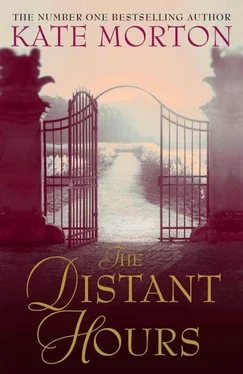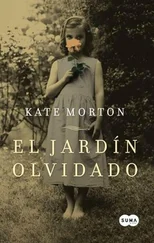She hadn’t.
Oh Christ, she hadn’t.
PART FOUR
Back to Milderhurst Castle
1992
Herbert lent me his car to drive to Milderhurst, and as soon as I was off the motorway I wound down the window and let the breeze buffet my cheeks. The countryside had changed in the months between my visits. Summer had come and gone, and autumn was now in its final days. Enormous dried leaves lay in golden piles by the side of the road, and as I slipped deeper and deeper into the weald of Kent, great tree branches reached across the road to meet at its centre. Every time the wind blew, a fresh layer was shed; lost skin, an ended season.
There was a note waiting for me when I arrived at the farmhouse.
Welcome, Edie. I had some errands that couldn’t wait and Bird’s laid up with the flu. Please find attached a key and settle yourself into Room 3 (first floor). So sorry to miss you. Will see you at dinner, seven o’clock in the dining room.
Marilyn Bird.
PS I had Bird move a better writing desk into your room. It’s a little cramped, but I thought you might appreciate being able to spread out with your work.
A little cramped was putting it midly, but I’ve always had a thing for small, dark spaces and I set about immediately making an artful arrangement of Adam Gilbert’s interview transcripts, my copy of Raymond Blythe’s Milderhurst and the Mud Man , and assorted notebooks and pens; then I sat down, running the fingers of each hand along the table’s smooth edge. A small sigh of satisfaction escaped as I leaned my chin on my hands. It was that first-day-of-school feeling, but a hundred times better. The four days stretched ahead and I felt infused with enthusiasm and possibility.
I noticed the telephone then, an old-fashioned Bakelite affair, and was possessed by an unfamiliar urge. It was being back at Milderhurst, of course; in the very same location where my mum had found herself.
The phone rang and rang and just as I was about to hang up, she answered, somewhat breathlessly. There was a moment’s pause after I said hello.
‘Oh, Edie, sorry. I was looking for your father. He got it into his head to -. Is everything all right?’ Her tone had sharpened like a pencil.
‘Everything’s fine, Mum. I just wanted to let you know that I’d arrived.’
‘Oh.’ A pause as she caught her breath. I’d surprised her: the safe-arrival phone call was not a part of our usual routine; it hadn’t been for around a decade, since I convinced her that if the government trusted me to vote, perhaps it was time she trusted me to take the tube without calling in my successful journey. ‘Well. Good. Thank you. That’s very kind of you to let me know. Your father will be pleased to hear it. He misses you; he’s been moping since you left.’ Another pause, a longer one this time in which I could almost hear her thinking, and then, all in a rush: ‘You’re there then? Milderhurst? How – how is it? How does it look?’
‘It looks glorious, Mum. Autumn’s turning everything to gold.’
‘I remember. I remember how it looked in autumn. The way the woods stayed green for a time but the outer tips burned red.’
‘There’s orange, too,’ I said. ‘And the leaves are everywhere. Seriously, everywhere, like a thick carpet covering the ground.’
‘I remember that. The wind comes in off the sea and they fall like rain. Is it windy, Edie?’
‘Not yet, but it’s forecast to come in blustery during the week.’
‘You wait. The leaves fall like snow then. They crunch beneath your feet when you run across them. I remember.’
And her last two words were soft, somehow fragile, and I don’t know where it came from but I was overwhelmed by a rush of feeling, and I heard myself say, ‘You know, Mum – I finish here on the fourth. You should think about driving down for the day.’
‘Oh, Edie, oh no. Your father couldn’t-’
‘ You should come.’
‘By myself?’
‘We could get lunch somewhere nice, just the two of us. Go for a walk around the village.’ The suggestion was met with the eerie whistling of the telephone line. I lowered my voice. ‘We don’t have to go near the castle, not if you don’t want to.’
Silence, and I thought for a moment she was gone, then a small noise and I knew that she hadn’t. I realized, as it continued, that she was crying, very lightly, against the phone.
I wasn’t due up at the castle to meet with the Sisters Blythe until the following day, but the weather was predicted to turn and it seemed wasteful to spend a clear afternoon sitting at my desk. Judith Waterman had suggested that the article include my own sense of the place so I decided to go for a walk. Once again, Mrs Bird had left a fruit basket on the bedside table and I selected an apple and a banana, then tossed a notebook and pen into my tote. I was surveying the room, about to leave, when Mum’s journal caught my eye, sitting small and quiet to one side of the desk. ‘Come on then, Mum,’ I said, snatching it up. ‘Let’s take you back to the castle.’
When I was a child, on the rare occasions that Mum wasn’t going to be waiting for me at home after school, I caught the bus instead to my dad’s office in Hammersmith. There I was supposed to find a patch of carpet – a desk, if I was lucky – in one of the junior partners’ rooms, a place to do my homework, or decorate my school diary, or practise signing the surname of my most recent boy-crush; anything really, so long as I stayed off the telephone and didn’t get in the way of industry.
One afternoon I was sent to a room I’d not been inside before, through a door I’d never noticed, right at the end of the very long hallway. It was small, little more than a cupboard with lighting, and although it was painted beige and brown, there were none of the glitzy copper-tone mirror tiles and glass bookshelves of the other corporate rooms. Instead, there was a small wooden table and chair, and a thin, towering bookcase. On one of the shelves, beside the jowly accounting tomes, I spied something interesting. A snow globe: you know the sort, a wintry scene in which a small stone cottage stood bravely on a pine-planted hill, flakes of white dusting the ground.
The rules of Dad’s workplace were clear. I wasn’t supposed to touch anything, and yet I couldn’t help it. The globe transfixed me: it was a tiny splinter of whimsy in a beige-brown world, a doorway at the back of the cupboard, an irresistible emblem of childhood. Before I knew it I was on the chair, dome in hand, tipping and righting it, watching as the snowflakes fell, over and over, the world within oblivious to that without. And I remember feeling a curious longing to be inside that dome, to stand with the man and woman behind one of the gold-lit windows, or with the pair of tiny children pushing a maroon sledge, in a safe place that knew nothing of the hustle and the noise outside.
That’s what it felt like to approach Milderhurst Castle. As I walked up the hill, nearer and nearer, I could almost feel the air changing around me, as if I were crossing an invisible barrier into another world. Sane people do not speak of houses having forces, of enchanting people, of drawing them closer, but I came to believe that week, as I still do now, that there was some indescribable force at work deep within Milderhurst Castle. I’d been aware of it on my first visit, and I felt it again that afternoon. A sort of beckoning, as if the castle itself were calling to me.
I didn’t go the same way as before; I cut across the field to meet the driveway and followed it over a small stone bridge, then a slightly larger one, until finally the castle itself came into view, tall and imposing at the peak of the hill. I walked on and I didn’t stop until I reached the very top. Only then did I turn to view the direction from which I’d come. The canopy of the woods was spread out beneath me and it looked as if autumn had taken a great torch to the trees, burnishing them gold, red and bronze. I wished I’d brought a camera so I could take a shot back for Mum.
Читать дальше












